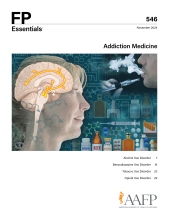
These key learning points summarize the consensus- and evidence-based recommendations included in this edition. The sources listed here for each statement recommend that physicians perform or implement these actions directly in a clinical setting.
1. Screen all adults for unhealthy alcohol use and provide brief in-office interventions for those identified as engaging in alcohol misuse.
Evidence rating: SORT B
Source: Section 1, reference 6
2. Use a withdrawal schedule, education, and psychotherapy aimed at addressing the underlying issue to reduce benzodiazepine use in older adults.
Evidence rating: SORT B
Source: Section 2, reference 30
3. Screen all adults for tobacco use; counsel them to quit; and offer support in the form of behavioral interventions and medications approved by the US Food and Drug Administration.
Evidence rating: SORT A
Source: Section 3, reference 14
4. Assess all adults for unhealthy drug use using screening questionnaires in settings where follow up supports for diagnosis, treatment, and care are available.
Evidence rating: SORT B
Source: Section 4, reference 23
5. Use medications to treat opioid use disorder and alcohol use disorder as part of a comprehensive approach to care.
Evidence rating: SORT B
Source: Section 1, reference 51
Subscribe
From $350- Immediate, unlimited access to FP Essentials content
- 60 CME credits/year
- AAFP app access
- Print delivery available
Edition Access
$44- Immediate, unlimited access to this edition's content
- 5 CME credits
- AAFP app access
- Print delivery available
